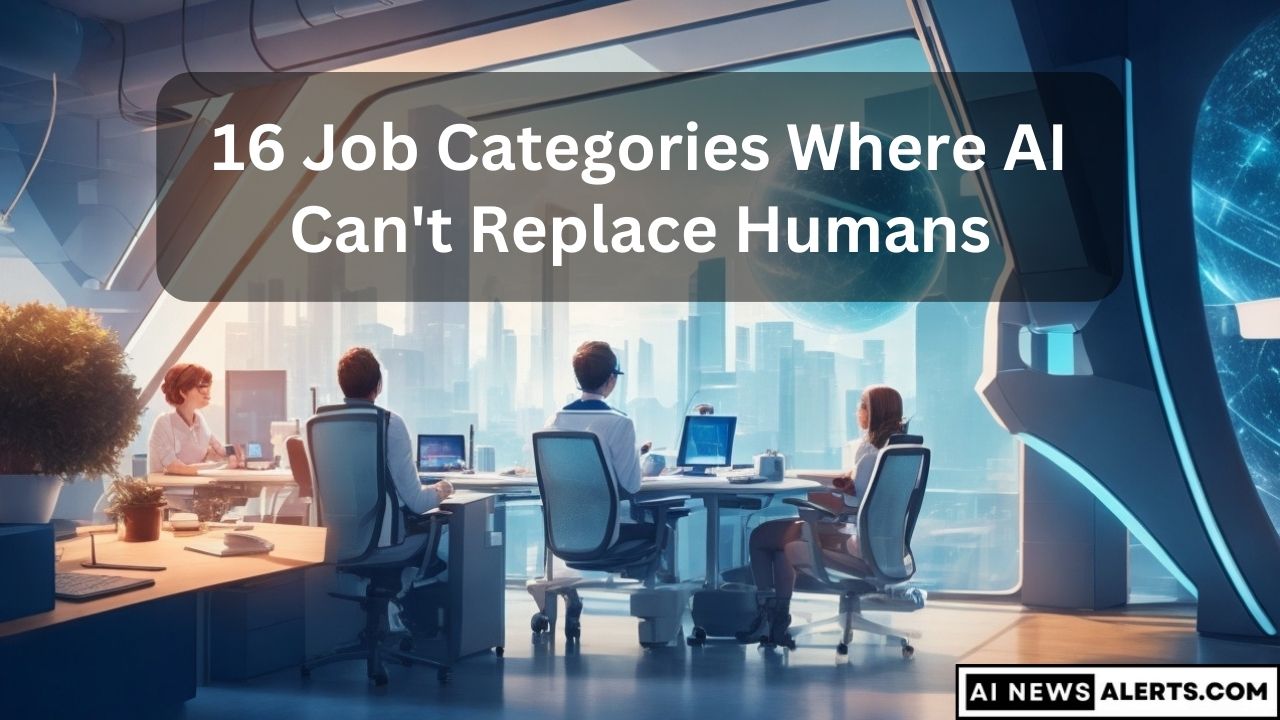We are in an era where AI is rapidly advancing, there is a common apprehension about the extent to which it might replace human jobs. While AI has undoubtedly transformed numerous industries and roles, there remain certain domains where its capabilities fall short. These are the fields that demand human intuition, creativity, emotional intelligence, and specialized expertise.
In the following, we will look into several job categories that AI cannot replace, exploring the distinct human qualities that make these roles irreplaceable.
1. Skilled Tradespeople
Imagine the intricate knowledge and quick problem solving skills required of certified plumbers and electricians. Their work often demands tackling unique challenges, both physical and mental, with each project.
While generative AI is remarkable, replicating the distinct skill set of a human tradesperson is still firmly within the realm of science fiction. Building a robot capable of performing such versatile tasks would be close to C3PO from ‘Star Wars’.
2. Construction
The construction industry embodies a perfect fusion of manual labor and cognitive expertise. While AI is increasingly contributing to design and engineering phases, activities like hammering nails and laying bricks continue to demand traditional human prowess.
Modular construction methods may rise, but the hands-on skills of carpenters and builders remain essential, with machines augmenting, not replacing their functions.
3. Food Preparation and Serving
Despite the rise of robots in fast food establishments, the culinary domain requires more than mechanization. Preparing and serving food involves a wide range of tasks that extend beyond AI capabilities. Goldman Sachs reports that about half of the tasks associated with cooking and serving food defy automation.
It’s not solely about efficiency; it’s also about preserving the human touch and emotional connection associated with dining experiences.
4. Psychology and Counseling
Conversational AI chatbots might find a place in the realm of mental health counseling, but they can’t replicate the intricate nuances of human therapists. While chatbots like Woebot offer basic mental health guidance, their capacity for genuine interaction and relationship-building remains limited.
Fields that demand deep human interaction, like nursing and medicine, are similarly resilient against AI encroachment.
5. Elementary School Teachers
The educational landscape is experiencing technological transformation, with AI-powered tutoring and personalized learning. Yet, the vital role of teachers in early education remains unparalleled. The need for human interaction and personalized guidance is particularly pronounced at the preschool and elementary school levels.
As students mature, AI may have a more prominent role, but the foundational years require the empathetic touch of human educators.
6. Professional Athletes and Coaches
While AI aids athletes and coaches in various ways, replicating the physical and mental prowess of professional athletes is a formidable challenge. AI assists in performance analysis and injury prevention, but it can’t replicate the intangible qualities that athletes and coaches bring to the game. Human motivation, adaptability, and emotional resilience are irreplaceable components of athletic success.
7. Drivers (For Now)
Although the prospect of self-driving vehicles is on the horizon, full-scale replacement of human drivers remains distant. Real-world driving involves navigating unpredictable situations, which AI struggles to handle.
The last 10 percent of the journey towards pervasive driverless vehicles poses considerable challenges due to the chaotic nature of public roads.
8. Truly Creative Thinkers
Creative professions like entrepreneurs, inventors, authors, and artists utilize AI as a tool but remain largely immune to full automation. AI might generate content, but it can’t genuinely ‘think outside the box’ or infuse work with personal experiences and emotions.
Creativity stems from uniquely human perspectives, making these roles a stronghold against AI’s encroachment.
9. Data Scientists
Data science, despite AI’s prevalence, retains its reliance on human intuition and ingenuity. AI can process data, but crafting the right questions, tailoring models, and interpreting results necessitate a human touch.
The contextual understanding and decision-making prowess that data scientists bring to the table remain beyond AI’s reach.
10. AI Ethicists
The ethical implementation of AI systems requires human oversight. AI ethicists ensure fairness, transparency, and privacy, considering societal implications. Their role necessitates deep insights into social norms and ethics, aspects that AI lacks the capacity to comprehend.
11. Cybersecurity Professionals
AI aids in cybersecurity, but human cybersecurity professionals strategize, interpret findings, and counter evolving threats. Understanding cybercriminal motivations and thinking creatively to anticipate attacks are areas where human expertise outshines AI.
12. Specialized Professionals
Jobs like doctors, lawyers, and scientists demand a deep understanding of their fields, coupled with critical thinking. While AI can assist, the intricate knowledge and nuanced comprehension required are difficult for AI to replicate fully.
13. Tech Project Managers
Project managers play a pivotal role in coordinating teams and making critical decisions. While AI can aid in tracking and risk management, human leadership, negotiation, and conflict resolution skills are indispensable.
14. User Experience (UX) Designers
AI can support aspects of UX design, but creating engaging interfaces that resonate with users requires a deep understanding of human psychology, aesthetics, and culture – qualities unique to human designers.
15. AI/ML Researchers
AI and Machine Learning researchers propel advancements through curiosity and critical thinking. AI can optimize models, but the creative questioning, hypothesis formulation, and innovative thinking in research remain exclusive to humans.
16. Data Storytellers
Translating complex data into compelling narratives requires an understanding of the audience and context. AI might analyze data, but weaving a narrative that resonates emotionally requires human finesse.
Wrapping Up
As AI continues to advance, it’s important to recognize that while certain roles may evolve and incorporate AI tools, the essence of human qualities such as intuition, creativity, empathy, and complex decision-making remains irreplaceable. The integration of AI augments human capabilities rather than rendering them obsolete.
The jobs outlined in this article exemplify the intricate interplay between technology and human expertise, showcasing a future where humans skillfully utilize AI’s potential while retaining the unique qualities that make us truly human.
